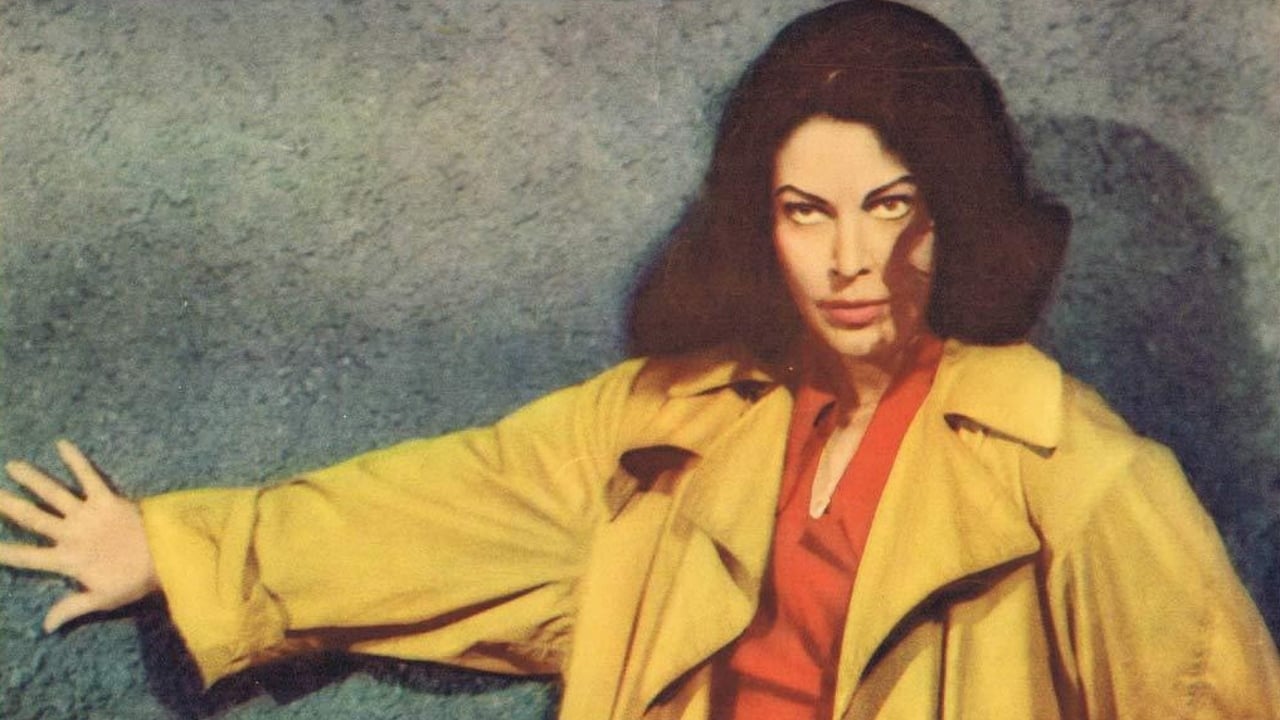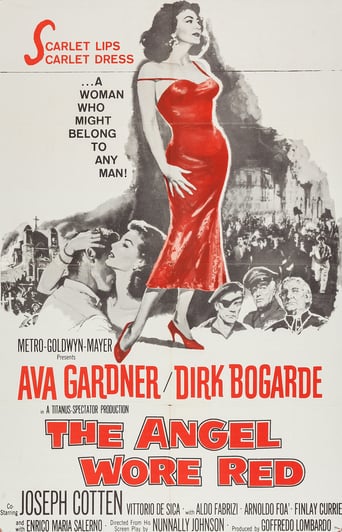Incannerax
What a waste of my time!!!
Mjeteconer
Just perfect...
Ceticultsot
Beautiful, moving film.
Married Baby
Just intense enough to provide a much-needed diversion, just lightweight enough to make you forget about it soon after it’s over. It’s not exactly “good,” per se, but it does what it sets out to do in terms of putting us on edge, which makes it … successful?
clanciai
This is a fascinating story with many aspects and undertones of fathomless depth and a very different view of the Spanish civil war than what is usually represented. The drama grips you at once, as the young priest leaves the church demonstratively in protest, which immediately throws you into an interesting development of character and events, as the civil war breaks out. Joseph Cotten is an American journalist who gives the drama a form, but Ava Gardner is the central figure, 'the angel in red', a prostitute in a night club which the unfrocked priest finds himself at home in. Another character is Aldo Fabrizi, who here repeats his martyrdom from "Rome, open city" as the carrier of the one holy thing still remaining as a hope for the people, a relic with a drop of a saint's blood with apparently tremendous national meaning to both believers and non-believers. On top of it all there is Vittorio de Sica as the general who better than anyone else sees through the utter absurdity and madness of this civil war.It is possibly the best film of the Spanish civil war that has been made, in spite of its foibles, as it presents a fairer and broader insight into the war than any other film I have seen on this bloody mess, which almost went on from 1936 until the year of the second world war, as an introduction. The love story is totally convincing and 'organic', as Polanski would have said, but the pathos of the film is tremendous, almost giving a documentary presentation of the war but from below, from the view of common people, a prostitute, a defrocked priest and innocent victims. It's like one of Graham Greene's best novels, but the music adds an extra dimension of beauty and infinite suffering and sorrow as well, like to the shocking war pictures of Goya. It's a great film, it can't be denied, and its lacks and wants are not enough to reduce anything of its deeply human and fascinating greatness.
hopkinshughes
Though far from perfect, I could watch this movie again, and perhaps even more than that. It's a fascinating movie, for one thing, pairing two of the most beautiful people who ever lived, in a story with real depth, or at least the promise of real depth, which says a lot in a world where 99 movies out of 100 don't even try. Imagine, complaining that at 37, Ava Gardner was "past her prime." It is wonderful to see Bogarde, whose roles usually had him sneering worldly-wise ironies, showing heartfelt passion for the good and the true. It is equally wonderful to see Gardner in a role far more suited for her than the calculating charmer or the tormented playgirl. She never seemed to be really trying until this one, where perhaps the part touched something deep in her. Their chemistry was superlative, their love scene one of the greats of all time, in my view. That this portrayal of a love that goes beyond time and place occurs in the context of one of the most astonishingly wicked and absurd wars of all time is another sublimity that seems to have whizzed right by all but one of the previous reviewers. Hemingway showed only that Robert Jordan thought the war was absurd, he didn't show its absurdity, which director Nunnally Johnson managed to do here in both direction and dialog, and against great odds. Like another of my favorites, Viva Zapata, this movie is a flawed masterpiece, better by far than 100 polished banalities. Blame its flaws on the trials of filming in 1960 (still stuck in the 50s), on sloppy editing, on the meaningless title, and the inevitable hurdles that writers and directors have to overcome in the complicated and difficult art of film-making, truly daunting in the case of this film. (Imagine attempting to film a love story between a priest and a prostitute in 50s Sicily?!) Don't blame the the actors, the director, or the beautiful and poignant story.
Tom May
I thought this film was rather lacking in both narrative and film-making technique. The script is far from awful, but also far from interesting in the most part. As the previous reviewer says, the lighting, choice of shots etc. was jarring and obscured characters (Joseph Cotten, who indeed established no presence at all in this film partly due to this). The historical period examined is a curious if comendable choice, and while the general details are correctly conveyed, no attempt is really made to discuss the issues in much depth. Good to see neither of the two sides particularly favoured, although such a commitment might have added at least some drama. Drama is scant in the film, with a few scenes written as exposition, delivered in a way just as stilted.The film actually has a rather good and eclectic cast for 1960, although the talents are ill used. Finlay Currie, Vittorio De Sica (well, seemingly in the main part a director), Dirk Bogarde (not yet of the stature achieved in films like "The Servant" and "Accident"), Joseph Cotten and Ava Gardner are all of some talent. De Sica's character who does indeed speak in a rather un-Italian, mid-Atlantic accent, which either suggests dubbing or a remarkably odd decision somewhere along the line - the character is portrayed as a Spanish patriot. The character's endless minor disparaging comments about modern warfare are mildly amusing in their frequency. I wouldn't say Ava Gardner is at all "past her prime" in this film, at about 37. Her performance is actually quite good, although lacking some credibility, and there are some pretty reasonable quiet scenes between her and Bogarde. Her beauty seems to have matured well, although the murky, technically below-par direction doesn't help this to show. Bogarde seemed quite good at times, but far from indelible or memorable in this role.
I would say this film is reasonably watchable and far from abject, but it is largely far from gripping or interesting.Rating:- **/*****
Eric Chapman
A fairly potent script with an interesting plot device at its core (both believers and non-believers alike chase after a sacred religious relic during a bloody civil war), undermined by rather bland, pedestrian film-making. Thus, it's not terribly surprising this was the last film directed by the prolific screenwriter Nunnally Johnson. He shoots just about everything in an overly dark and cramped way making it often impossible to determine where a scene is set, let alone what is going on or even who is in it. This may have been intentional, with the absence of light meant to convey the spiritual darkness in which the country of Spain was submerged at the time, but it comes off as crude and makes for rough viewing. There's something strange about the sound as well; there are few if any sufficiently lit close ups and it seems as if some of the actors' voices have been dubbed. Vittorio DeSica's character, for instance, comes across a bit like Truman Capote playing General Patton. Joseph Cotten pops up every now and again, as a cynical, gravel-voiced newsman, (in fact, he also narrates) but you never ever really see his face and there is something disembodied about his entire presence. It's all a bit unsettling.Nonetheless, if you can endure its flaws, the movie raises some thought provoking questions on the nature of faith and religion in times of strife, and Dirk Bogarde is quite impassioned as the troubled priest. Ava Gardner, however, is noticeably past her prime as Bogarde's love interest, and her character isn't adequately fleshed out.

